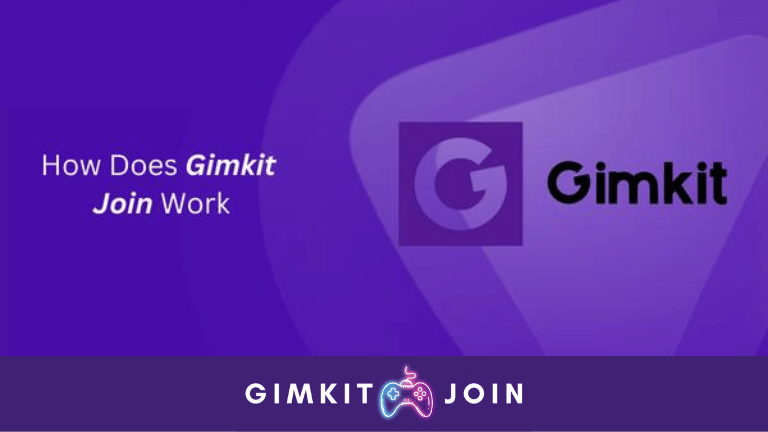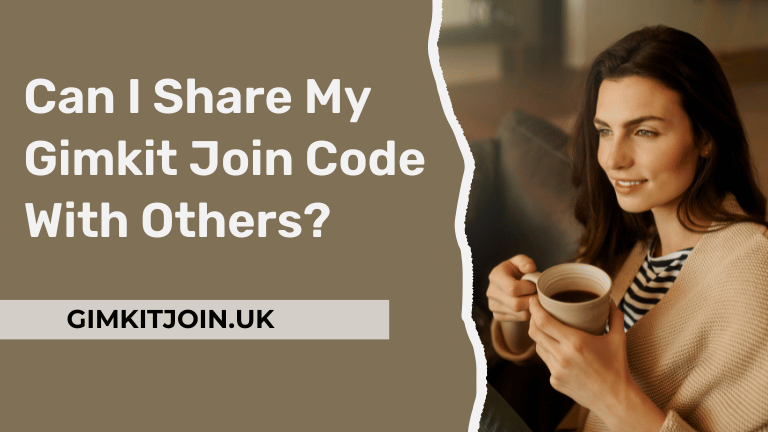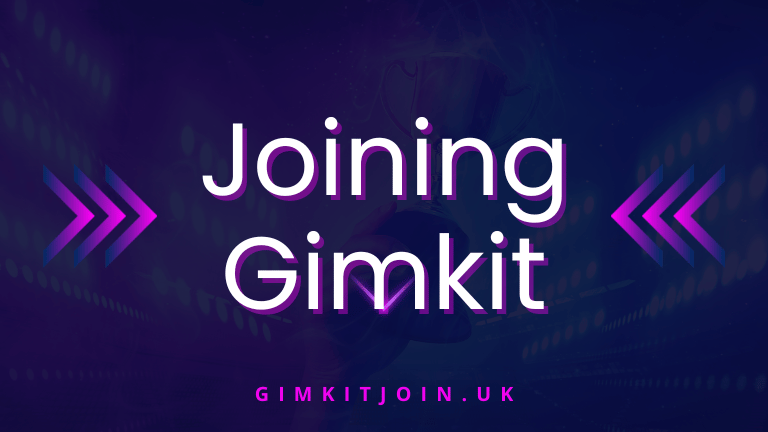Can I Share My Gimkit Join Code With Others?
Can I Share My Gimkit Join Code With Others? Gimkit is an engaging online game platform often used by teachers to help students review course material. It has exploded in popularity among students and educators alike in recent years. One of the most common questions about Gimkit is whether you can share your join codes with others to allow them to participate in your game. We will thoroughly explore the ins and outs of sharing Gimkit join codes in this ultimate guide.
What is a Gimkit Join Code?
A Gimkit join code is an alphanumeric code that is generated whenever you create a new Gimkit game as the host. This unique code allows other players to quickly join your specific game instance simply by entering the code on the Gimkit website.
Join codes eliminate the need for a host to manually invite players to their game one-by-one. Instead, you can simply share the auto-generated join code and allow anyone with access to rapidly join with just a few clicks. This makes setting up multi-player Gimkit games incredibly quick and seamless.
Why Share Join Codes?
There are several excellent reasons why both teachers and students may want to share their Gimkit join codes more broadly:
Enable Whole Class to Join Easily
As a teacher, you likely want to use Gimkit games to engage your entire class simultaneously. Manually inviting 30 students can be extremely tedious and time-consuming. If you generate a join code when first creating your game, you can display or share the code with students just once to enable instant access for everyone.
Encourage Study Group Review
For solo learners using Gimkit to study, sharing your join code can allow friends to connect for engaging group review sessions. Rather than studying alone, you can turn preparation for an upcoming test into a fun competition by inviting your peers.
Host Multiplayer Parties
Gimkit also appeals to the casual gamer who simply wants to enjoy friendly competition. You can host exciting multiplayer trivia parties by creating a game and spreading the join code across your network of friends or on social media to allow anyone interested to participate. With enough players, this creates incredibly fun and interactive online events.
Guidelines for Sharing Join Codes
While Gimkit allows and encourages code sharing to maximize accessibility, there are still a few guidelines to keep in mind:
Respect the Host’s Intentions
A teacher creates Gimkit games with a specific educational purpose in mind. If you join someone else’s game through an indirectly shared code, be sure to still respect the original intent by not intentionally disrupting the experience or leaderboard.
Don’t Share Codes Publicly Without Consent
Posting someone’s join code online publicly without their consent can lead to chaos. Random people can discover and flood a game, creating distractions that diminish the host’s objectives. Before sharing a code on public platforms, ensure you have the host’s permission.
Practice Good Digital Citizenship
Whether joining a teacher’s class game or a peer’s private competition, you should exhibit the same mature and responsible behavior online as you would in-person. Abide by rules, avoid inappropriate or off-topic content, and maintain a constructive environment.
Can Teachers Limit Join Code Access?
Yes, one of the best aspects of Gimkit Join for teachers is the ability to control game access. Educators have full authority to restrict join code sharing capabilities by changing one simple setting when first launching a game.
To limit join code access as the host teacher:
- Upon creating your new Gimkit game, click “Settings” in the sidebar menu.
- Find the “Game Growth” setting under Game Options.
- Change the dropdown box from “Allow anyone with the join code to join” to “Only allow people I invite.”
- Click the blue “Update” button to save your preference.
With this single toggle adjusted, only you can directly invite people via username to participate in your controlled game instance. The broader join code essentially becomes inactive and invalid, preventing those without an explicit invite from accessing your game.
Utilizing the “Only allow people I invite” option enables teachers to carefully curate participation based on course enrollment while still simplifying the invitation process with bulk uploads of student usernames.
Creative Ways Teachers Encourage Code Sharing
Despite the ability to limit access, many teachers still promote students to share join codes among classmates for supplemental peer learning. Some creative authorized sharing ideas adopted by educators include:
Facilitate Study Groups
Teachers often allow code sharing specifically to facilitate additional study sessions. With the teacher’s Gimkit game as a foundation, students are encouraged to form small review groups and share the code to engage in collaborative practice outside of dedicated class time.
Flipped Classrooms
In flipped classrooms where students gain first exposure to content outside of school, teachers may share Gimkit codes early to enable peer learning through gameplay before assessing comprehension formally during in-person class meetings.
Extra Credit Incentives
Some teachers award nominal extra credit points if students can provide proof that they achieved certain high game scores or times using a teacher’s Gimkit game. Authorized and limited code sharing can give students extra help reaching incentive benchmarks.
The key is that educators enable the desired code sharing behaviors only in narrow and controlled circumstances to maintain the integrity of their original learning aims.
Can Students Share Teacher Codes Freely?
With the join code access toggle set to “Only allow people I invite” – no, students cannot freely share their teacher’s private Gimkit join code. The code essentially becomes one-use-only for those students directly invited and disables all further sharing functions.
Attempting to share the code beyond the teacher’s enrolled participants will simply result in an error message for unauthorized students stating “This join code is invalid or has expired.” Strict control remains in the teacher’s hands.
However, an unrestricted join code with the “Allow anyone with the join code to join” option still enabled grants students full discretion to share access across expanding peer groups. So long as the teacher configures inclusive settings upon launch, student sharing abilities remain unlimited.
Should You Post Gimkit Codes Publicly?
Both teachers and students should exercise extreme caution before posting any Gimkit join codes publicly on social media, community forums, or other broad platforms.
While limited sharing among closely connected groups like classmates can prove constructive, publically searchable games inherently lose oversight of participants. This risks diminishing the host’s vision for their curated game with unvetted players flooding lobbies.
Publicly posted join codes also enable cheating vulnerabilities. If homework review game codes become widely accessible online, nothing prevents students from collaborating in real-time across distances to ace assignments rather than studying the material independently.
Therefore, we only recommend public platform sharing if the game creator takes an open invitation approach intentionally seeking viral gamer engagement from random users. Community games meant for entertainment can thrive on public accessibility, but controlled learning environments generally should not.
Evaluate your specific intentions before releasing any Gimkit join codes into the wild across mass sites like Twitter or Reddit. If hoping to maintain order around a central educational objective, limit distribution to purposeful private channels.
Key Takeaways: Can I Share My Gimkit Join Code?
Sharing Gimkit join codes enables fast multiplayer game access, group study, and expanded peer learning opportunities. Both teachers and students can benefit from judicious code distribution.
Ultimately, game creators drive sharing functionality based on their “Game Growth” invitation setting preferences. Teachers can restrict codes to prohibit sharing beyond explicitly invited participants when desired.
While some code sharing is often constructive, publicly posting sensitive game codes risks undermining hosts’ controlled objectives by allowing disruptive random gamers. Evaluate intentions before releasing codes openly.
Code sharing remains a useful tool on Gimkit, but should be handled responsibly based on participation goals. Apply sharing privileges carefully, and always respect original gaming agendas set by teachers or student hosts.
When in doubt, request explicit permission before passing a join code beyond its originally intended recipients. Thoughtful distribution retains order which maximizes the incredible engagement potential of Gimkit for impactful learning.
Common Code Sharing FAQs
As we have explored, appropriately sharing or restricting access to Gimkit join codes depends greatly on the host’s intended purpose for the game. Navigating when and how to extend access can understandably trigger many questions among new users. Let’s break down answers to some of the most frequently asked code sharing questions:
Can Students Share Teacher Codes With Friends?
If the teacher opts to limit join code access to only explicitly invited students, no – students cannot share the restricted code further without permission. Attempting to invite friends to a teacher’s private game will fail.
However, if the educator enables the code for wider access, students can share across friends without limitations. But they should still respect the academic nature rather than undermine core learning goals.
If I Find a Code Online, Can I Join That Game?
Stumbling upon a join code on public forums technically allows you to input it and attempt accessing someone else’s Gimkit game. But joining an unknown game without consent from the original host is extremely inconsiderate.
You have no context for their educational or entertainment aims. Barging into gameplay disrupts progress and defeats personalized objectives. Avoid hijacking codes shared publicly without real invitation.
Can Teachers Revoke Access After Sharing Codes?
Yes, even if a teacher initially grants broad code sharing permissions, they retain full authority to revoke availability moving forward. By returning to the “Settings” menu and updating the “Game Growth” toggle to “Only allow people I invite” at any time, new join attempts fail regardless of prior access.
Teachers can change restrictions mid-game if they observe disruption from unauthorized players. This also lets them gradually enable wider sharing with specific groups like facilitating broader study sessions only when they deem appropriate at each stage.
If Someone Shares My Code Without Asking, Should I Be Mad?
You have every right to be upset if someone irresponsibly posts your private Gimkit join code publicly without permission. They clearly ignored guidance throughout this article regarding respecting hosts’ control.
However, getting angry often proves less constructive than simply revoking join abilities immediately while politely educating the original code sharer on proper etiquette going forward. Turn ignorance into a teachable moment for responsible digital citizenship.
Can I Get In Trouble for Sharing Teacher Codes?
Students who share Gimkit access codes against explicit teacher prohibitions certainly risk disciplinary consequences like revoked gameplay privileges or damaged trust for defiance. But most educators encourage limited sharing specifically to enable group studying.
The only real trouble arises when students promote access irresponsibly across wide public platforms spreading classroom codes far beyond intended friendly study partners. Avoid unchecked distribution reaching external unknown participants.
We recommend directly asking your teacher before ever sharing a join code to confirm if, with whom, and how broadly they approve distributing access. Responsible permission seeking prevents major behavioral violations.
Risks of Overexposure Through Code Sharing
While judicious Gimkit join code sharing facilitates constructive engagement, unchecked distribution inherently decreases control. Several risks arise when codes reach unintended audiences, especially across vast public platforms. Let’s examine the dangers of code overexposure:
Game Disruption
A teacher carefully configures Gimkit settings to meet disciplinary goals and challenges suited for their students’ ability level. When outsiders access a game, they may not align with intended pacing and difficulty. This throws off student performance analysis for educators.
Similarly, unofficial participants could troll live gameplay with silly nicknames or purposely incorrect answers detracting focus for legitimate contenders. Keep join codes restricted among aligned participants to maintain order.
Cheating Vulnerabilities
As highlighted earlier, Gimkit games often contain exam preparation content or assess comprehension of recent academic lessons. If strangers access various teachers’ codes online, nothing prevents them from collaborating to ace assignments rather than studying independently.
Confidential test content also gets exposed externally through overexposure. This facilitates cheating limitations that diminish the validity of teachers’ work. Refrain from public code sharing to avoid cheating risks.
Privacy Invasions
User privacy represents a largely underestimated vulnerability among overexposed join codes. Most Gimkit gamers innocently reveal identifiable information like full real names and profile photos when configuring their player profile.
Strangers who infiltrate games with leaked codes gain visibility into participants’ identities often without consent. Furthermore, confidential student data falls into unauthorized hands. Limit code availability to protect privacy.
Best Practices for Secure Code Sharing
When leveraged deliberately, join code accessibility can profoundly supplement learning on Gimkit across expanding peer groups. We recommend several practices to maintain security when disseminating access:
Confirm the Host’s Preferences
Before ever sharing a join code first confirm if, with whom, and how widely the game’s host approves distributing access. Abide by stated permissions to prevent disruptive defiance.
Emphasize Respectful Participation
Especially when allowing friends to access a teacher’s code, set expectations for respectful conduct promoting the game’s core educational priorities rather than undermining through ignorance.
Revoke Availability Promptly
If you notice early signs of participation moving beyond intended audiences, immediately return to privacy settings revoking all join abilities to prevent unmanageable oversharing moving forward.
Oversee Code Integrity
A host who agrees to authorized code sharing beyond direct invitations assumes responsibility for monitoring participation to ensure audiences remain aligned with priorities throughout evolving gameplay. Check in frequently.
Proactive oversight, permission communication, and prompt revocation empower hosts to include larger audiences safely while avoiding risks of overexposure through unchecked viral spread.
Improving Codified Access on Gimkit
While custom join codes currently enable permission-based multiplayer access, the platform’s sharing and privacy limitations reveal room for improvement in securing game integrity. We recommend several upgrades for hosts:
Code Complexity Settings
Beyond a simple on/off toggle, hosts should determine code length and complexity upon game creation. Settings controlling join code generation from 4 to 12 characters including alphanumeric combinations, cases, and symbols would prevent easy guessing by strangers.
Access Logs
Game creators lack visibility into who specifically utilizes a given join code to enter matches. Logging accessed user profiles even when allowing anonymous play would increase transparency on participation. Data trails help inform revocation decisions by mapping invitation branches.
Permission Confirmations
Rather than inputting freely discovered codes, user experience upgrades should enforce initial permission confirmation before gameplay. Joiners could request access by emailing hosts to verify authority before actually participating with any code.
Mid-Game Revocation Messaging
Currently unauthorized players receive generic error messaging on revocation attempts with no path to participation. Tailored notices directing users to formally request access from hosts improves culture even amid denied entry.
Small UX barriers limiting unilateral entry in combination with enhanced host oversight empower teachers and students alike to more strategically leverage the inherent benefits of access code distribution across approved participant groups.
Key Takeaways: Is Gimkit Code Sharing Ideal?
When thoughtfully facilitated, join code accessibility drives peak engagement. But reckless overexposure breeds detrimental disruption in opposition of a host’s tailored intentions.
The principal keys to responsible Gimkit code sharing include:
- Respect the host’s authority over distribution permissions
- Align added participants with the game’s core priorities
- Monitor participation levels to confirm constructive sharing
- Revoke access instantly if disorders arise
Smooth mechanics enabling digitally managed permissions could further enhance controlled sharing. But most vital remains upholding the established educational or entertainment vision guiding any Gimkit game by avoiding hijacking across public crowds.
Empowered hosts drive effective engagement through astute accessibility management. With Gimkit expanding exponentially across classrooms internationally, establishing deliberate code sharing etiquette sets the stage for protected learning on this incredible modern platform built to energize knowledge. Heed responsible practices as you leverage multiplayer power through join codes.

FAQs
Can I share my Gimkit join code with others?
Yes, you can share your Gimkit join code with others to invite them to join your game or session.
How do I share my Gimkit join code?
To share your Gimkit join code, simply provide the code to others either verbally or through messaging apps, email, or social media.
Is there a limit to how many times I can share my Gimkit join code?
There is no limit to how many times you can share your Gimkit join code. You can share it with as many people as you like.
Can I reuse my Gimkit join code for multiple sessions?
Yes, you can reuse your Gimkit join code for multiple sessions. Each time you start a new game or session, you can use the same join code.
What should I do if someone shares my Gimkit join code without my permission?
If someone shares your Gimkit join code without your permission, you can regenerate a new join code to prevent unauthorized access to your game or session.


![5 Steps to Earn $2000 Per Month as a Gimkit Affiliate [2024]](https://gimkitjoin.uk/wp-content/uploads/2024/02/How-does-the-Gimkit-affiliate-program-work-1-768x461.png)
![How to Delete Your Gimkit Account?[2024]](https://gimkitjoin.uk/wp-content/uploads/2024/02/TOP-10-5-768x461.png)
![One Way Out 10 Purple Card Keys EXPLAINED [Newest Gimkit Game Mode 2024]](https://gimkitjoin.uk/wp-content/uploads/2024/03/Is-Gimkit-Available-on-Xbox-Exploring-the-Possibilities-11-768x461.png)


![The Ultimate Guide to Every Weapon in Gimkit [2024]](https://gimkitjoin.uk/wp-content/uploads/2024/05/How-to-Win-Gimkit-Every-Time-Fast-Method-2024-10-768x461.png)